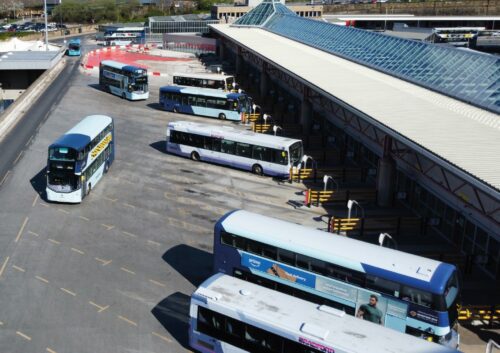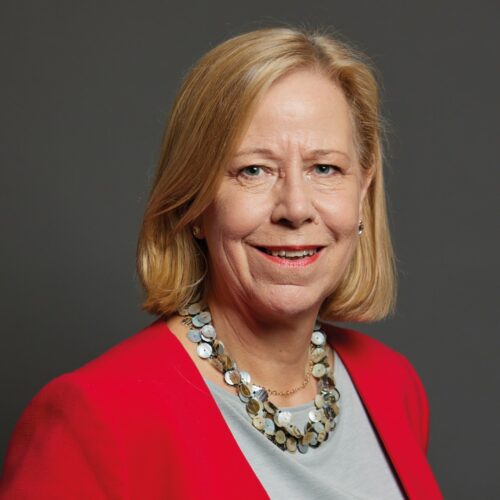
be done, especially to support rural services, and that an England-wide agreement is needed on youth fares. RAY WARD
A new, nationally-coherent scheme for young people’s concessionary travel is among the recommendations set out by the Transport Committee in its latest report to Government
More ambition is needed to undo a decade of decline and get passengers back on board buses in England, the Transport Committee says. The Committee’s latest report calls on the Government to reform the way local bus services are funded and to adopt a national ambition for a minimum level of public transport connectivity, a move it says would protect residents in England’s towns and villages from becoming increasingly isolated.
Although still the most-used form of public transport, Department for Transport (DfT) data shows that the number of bus journeys taken in England outside of London fell from 4.6 billion in 2009 to 3.6 billion in 2024, a reduction of 21.7%, whilst the County Councils Network reports that between 2019 and 2024, bus services decreased by 18% on average in areas covered by county and unitary councils.
Discussing the new report, Transport Committee Chair Ruth Cadbury MP said: “Buses are fundamental to many people’s quality of life. Without them, residents on low incomes, older and younger people, face social exclusion or being cut off from employment and services like hospitals or education. In many areas that is tragically already the case.
“The DfT should change the way funding is provided to ensure councils and bus firms would be committed to running socially necessary services, and, on that basis, should also adopt an ambition for all councils to develop and maintain a minimum level of public transport connectivity. To achieve this the sector will need greater financial certainty, which is why we say the Government should announce funding in five-year blocks.
“Those most affected by unreliable or even non-existent buses include the young, who need them to get to school, college, university and their first jobs. Denying young people these experiences denies them their life chances. We call for a universal, free bus pass for all under-22s to equalise opportunity.
“While the bus fare caps have been beneficial, the Government has yet to spell out a coherent strategy of what they aim to achieve, and whether more targeted options could produce better outcomes.
“Franchising works for London and Manchester but is unlikely to be a silver bullet for the rest of the country. Many local councils’ workforces now lack the skills and capacity to suddenly start overseeing bus services. We therefore say that the Bus Centre of Excellence should be expanded to provide more targeted support and training.
“While the Government’s Bus Services Bill contains positive ideas, the Transport Committee’s report says ministers should go further to get bums back on seats.”
Buses needed
Among other difficulties, the Committee heard that, amid a backdrop of scarce funding and revenue, bus firms have been incentivised to cut less commercially viable services and prioritise those that attract more fare revenue, leaving some communities even more isolated and making the bus a difficult choice for those intending to rely on it for long-term commuting.
The Transport Committee has called for the DfT to adopt a national ambition for councils to provide a minimum level of public transport connectivity by the end of this Parliament in 2028-29. The report notes that DfT has promised investment in measures to improve journey times and reliability and to promote patronage and brings down operating costs, but that funding is generally provided on an annual basis and subject to change, making it difficult for councils and bus operators to plan ahead.
However, in the Spending Review in June, the Government confirmed it would spend £900m a year on bus services for the next three years, and the Chancellor has also announced funding settlements for city region mayors up to 2032. The Committee says it welcomes the Government’s longer-term approach, but recommends that it should set five-year settlements for both capital and revenue funding.

Under-22s and caps
The Transport Committee’s report highlights that in some areas, limited services and high fares make it harder for young people to reach education, training, entry-level jobs, or shift-based work. It believes that England’s patchwork of local youth concessions requires a coherent national approach to ensure fair access and to drive economic growth and equal opportunity, and recommends that the DfT’s review of the English National Concessionary Travel Scheme should consider piloting a free bus pass for under-22s, valid for travel at any time of day.
Addressing the issue of the fare cap, the Committee says a longer-term strategy is needed, especially as fares have risen by some 505% since 1987, outpacing inflation of 280% over the same period. It reports that between 2022-23 and 2023-24, the fare cap helped bus ridership in largely rural areas rise by 10.1%, but the Committee argues that the Government’s bus fare caps, though positive, are only a short-term measure.
The DfT should develop, within 12 months, clear strategic priorities for what bus fares are aiming to achieve, the Committee recommends, setting out the strategic purpose of fare structures and guiding consistent, transparent fare-setting at a local level.
The Committee also recognises that franchising is not a cure-all. “
When done successfully, franchising can offer a pathway to more integrated and accountable services. However, many hollowed-out local authorities currently lack the legal, commercial, and operational capacity to take on the risks and challenges of franchising,” it believes. There is a recommendation that the DfT’s Bus Centre of Excellence should be expanded to provide more targeted support to local authorities that may look to adopt franchising.
Another recommendation is for grants to be weighted towards rural areas, as current strategies fail to recognise the distinct challenges of running services in those places, such as higher operating costs. “The DfT should consider introducing a rural weighting into its revised Bus Service Improvement Plan funding formula to reflect the higher per-passenger costs. This would help ensure that ambitions to improve are not undermined by geographic disadvantage,” says the Committee, whilst also recommending that the Bus Service Operators Grant should be reformed so that it would instead be based on passenger journeys rather than mileage, to incentivise operators to grow their passenger numbers.
Industry voice
Responding to the report and the call for a new under-22s travel scheme, Chief Executive of the Confederation of Passenger Transport Graham Vidler said: “Bus operators welcome the Transport Committee’s ambition of getting more bums on seats, and MPs’ call for a new national bus strategy. But perceptions of a ‘decade of decline’ in bus travel are outdated and far too gloomy.
“The number of bus journeys taken across Britain rose by 8% last year, including a 10% increase in bus travel across England outside London – the biggest rise for decades. The Covid-19 pandemic and local authority austerity harmed the bus network. But bus travel is staging a comeback, supported by the national fare cap and investment by bus companies in modern, environmentally friendly vehicles.
“Bus operators wholeheartedly support initiatives to encourage more young people to catch the bus. Promoting bus travel to under 22s will help to build a lifelong habit, shifting the common assumption that everybody needs to learn to drive at 17. One option would be a £1 fare cap for young people, which would cost between £100m and £150m a year to implement across England.
“Bus operators would welcome minimum bus service levels nationwide – although this can only be delivered through sustained, long-term funding for the industry and would need to be backed by hard cash from the Treasury. To make it work, the Government needs to provide five year visibility on funding and should act to ensure transport spending is ringfenced for buses.
“To truly boost bus usage across the country, politicians need to commit to speeding up buses. That means round-the-clock bus lanes, traffic light priority and better co-ordination of roadworks to take buses out of traffic and get passengers to their destinations quickly. Faster journeys would create a virtuous circle of more passengers on board, more investment by bus companies, greater frequencies and less car traffic on the road.
“Every pound invested in local buses brings £4.55 of benefits for communities, the environment and the health of the nation.
An investment in buses is an investment in the well-being of future generations.”
Meanwhile, Bus Users UK welcomed the moves to improve transport connectivity for local communities. Commenting on the report, Bus Users UK Director for England, Lydia Horbury said: “This report is both a wake-up call and an opportunity. Buses are not just vehicles; they are lifelines connecting people to jobs, training, healthcare and each other. For too long, services have been reduced or cut back entirely, leaving communities stranded and young people locked out of opportunities.
“We fully support the call for a free bus pass for under-22s – it’s an investment in our future workforce, our economy and our environment. But it can only succeed if every community, urban or rural, has a reliable, affordable and accessible bus network. The Government must seize this moment to deliver a bold, long-term plan that puts passengers first.”

